What are Finite and Nonfinite Verbs?
Read the following sentence.
Paul loves to read.
The verb highlighted in green in the sentence is loves; its tense is the present tense. However,
the highlighted phrase in red, to read, has no tense of its own despite having a verb in it.
Verbs like loves are called finite verbs because they have a tense.
Verbs like to read are called nonfinite verbs because they have no tense.
Examples of finite verbs:

The highlighted verbs in the above examples have tenses.
Examples of infinite verbs:

The highlighted verbs in the above examples do not have tenses.
Verbals
What are Verbals?
• Verbals come under the category of nonfiniteverbs.
• These are words formed out of verbs but function differently fromthem.
• They perform fuctions of other parts ofspeech.
• There are three main types of verbals inEnglish.
• Gerunds
• Infinitives
• Participles
1. Present participle
2. Past participle
The Gerund
• A gerund is a verbal which ends in –ingand functions like a noun.
• It can play the role of asubject.
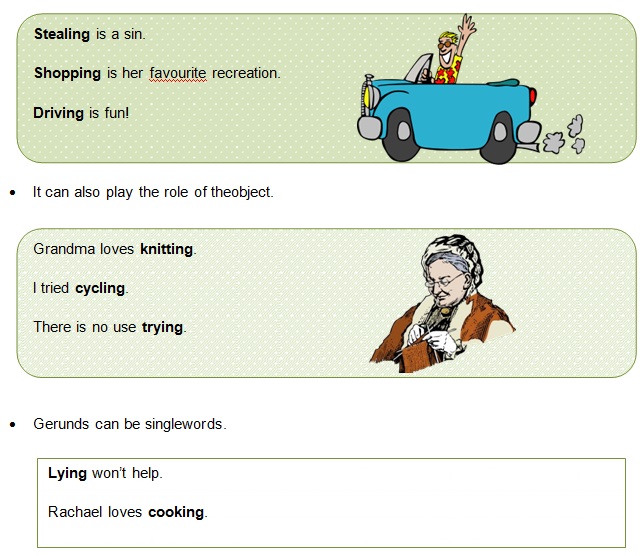
• Or they can be gerundphrases.
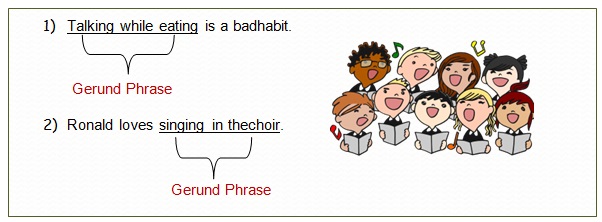
The Infinitive
• Infinitives - are verbals which are usually formed when the preposition
‘to’ is added to a simple present tense of averb.
![]()
• Infinitives are used to express ideas such aspurpose.
I brought some chocolates to gift the family.
She kept some potted plans to decorate the window sill.
• They can function like nouns as a replacement forgerunds.
To err is human, to forgive is divine.
Compared to
Erring is human, forgiving is divine.
• They can sometimes take anobject.
She wanted to buy a mansion.
Teacher told him to do his homework.
• Or be objects of verbsthemselves.
Deepak loved to read.
The police wanted to know the details.
• They can be complements toobjects.
We bought a bone for the dog to chew.
The man picked a different route to jog.
• They can also complementadjectives.
He is bornto rule.
Leticia is very impatientto wait for another 10 minutes.
• Sometimes, an infinitive can function without the preposition to init.
The teacher made them read from the book.
Rajesh can walk for two hours at a stretch.
The Participle
• Participles are words which are formed from verbs but have the qualities ofadjectives.
• Participles are of two types.
o Present participle: Formed out of present tense verbs or -ingverbs.
The campers slept inside sleeping bags.
She cooked eggs on the frying pan.
o Past participle: Formed out of past tense verbs ending in -ed or-en.
Farmer John has a spotted cow.
The land was parched and barren.
• They can be used as complements forsubjects.
The twig is broken.
The toast tastes burnt.
• They can also be used as complements forobjects.
The family found the baby crying.
Lalith saw him stealing from the cupboard.
Transitive and IntransitiveVerbs
What are Transitive and Intransitive Verbs
Object
What is an object?
• An object is the word which follows averb.
• It can be a noun, a pronoun or a gerund which gets affected by the action expressed by theverb.
• It is a part of the predicate.
Jamie chewed a bubblegum.
Supriyamended her shoes.
The dog found a bone.
The words highlighted in red are the objects of the verbs which are highlighted in green.
Now let us read the following sentences.
Maria complained to her landlord.
Fiona baked bread in the new oven.
Nainasmiled at her friends.
Arpita threw a stone in the still water.
Observe the verbs in the sentences.
• Complained, baked, smiled andthrew
• Add the interrogative pronoun ‘what’ to the verb (verb + what?)
• complained what? -?
• baked what? -bread
• miled what? -?
• threw what? -stone
• Verbs like complainedand smiledare called intransitive verbs because they do not haveobjects.
• Verbs like bakedand threware called transitive verbs because they haveobjects.
Some verbs have to depend on their objects for the completion of meaning, while some verbs can express
meaning on their own. The verbs which need the support of their objects are known as transitive verbs
and the ones which can stand on their own are called intransitive verbs. The actions expressed through
transitive verbs affect their objects, whereas intransitive verbs do not have objects toaffect.
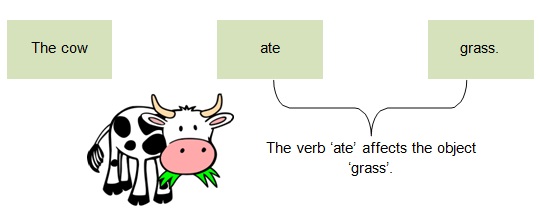
Read the following verbs and add the interrogative pronoun ‘what’ or ‘whom’ to them.
Make two columns and write the transitive verbs in one and the intransitive ones in the other.
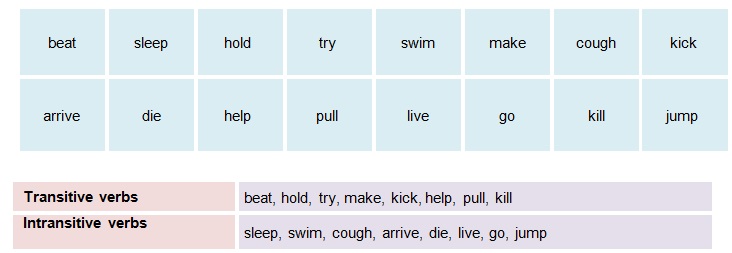
Let us see how these verbs are used in sentences.
Rajesh lookedoutside.
looked– intransitive, because it does not have an object (looked what?)
Pablo calledhis valet.
called – transitive, because it has an object ‘valet’ (called whom?)
Jyothi laughedloudly.
laughed – intransitive, because it does not have an object (laughed what?)
Jack brewedsome tea.
brew – transitive, because it has an object ‘some tea’ (brewed what?)
However, some verbs can function transitively or intransitively depending
on the context. Here are a few examples:
She cried bitterly. (intransitive)
The thief cried crocodile tears. (transitive)
The chef cooked for a living. (intransitive)
Martha cooked a delicious quiche. (transitive)
Agatha wrote for a living.(intransitive)
Agatha wrote stories of crime and mystery. (transitive)
Prakash ate his fill. (intransitive)
Darlie ate potato chips. (transitive)
Direct and Indirect Objects
When it comes to transitive verbs, there are two types of objects.
• Direct objects
• Indirect objects
What are Direct Objects?
• Direct objects are those that appear immediately after theverbs.
• They are directly affected by the actions of the verbs. They answer the question ‘what?’ or ‘whom?’.
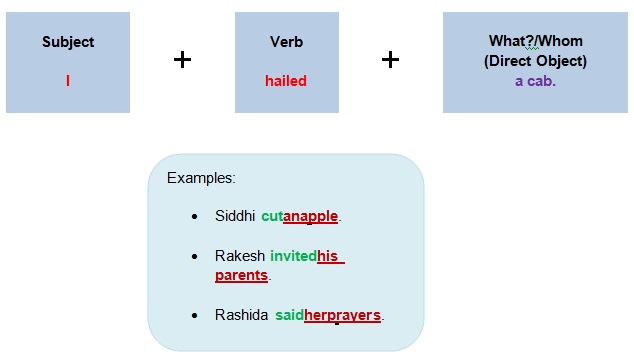
What are Indirect Objects?
• Indirect objects are those that do not appear immediately after verbs, but they are separated from
the verbs by directobjects.
• They are not immediately affected by the actions of theverbs.
• They answer the question Preposition + what?/Preposition + whom? (to what?/towhom?).
• They are usually associated with verbs of giving or communicating like give, offer, show andask.
• Indirect objects are either nouns or pronouns and do not form a part of the main predicateunlike direct objects.

• Maria returned the bookstome.
• The children constructed a sandcastlein thesand
• The campers cooked some fishfor themselves
Sometimes, the prepositions before the indirect object may not be evident in the sentence. They may be implied.

Examples:
• Uncle Grumpy gave Aunt Idaa coldlook.
• She passed himthesalt.
• I brought my mothera brand newbag.